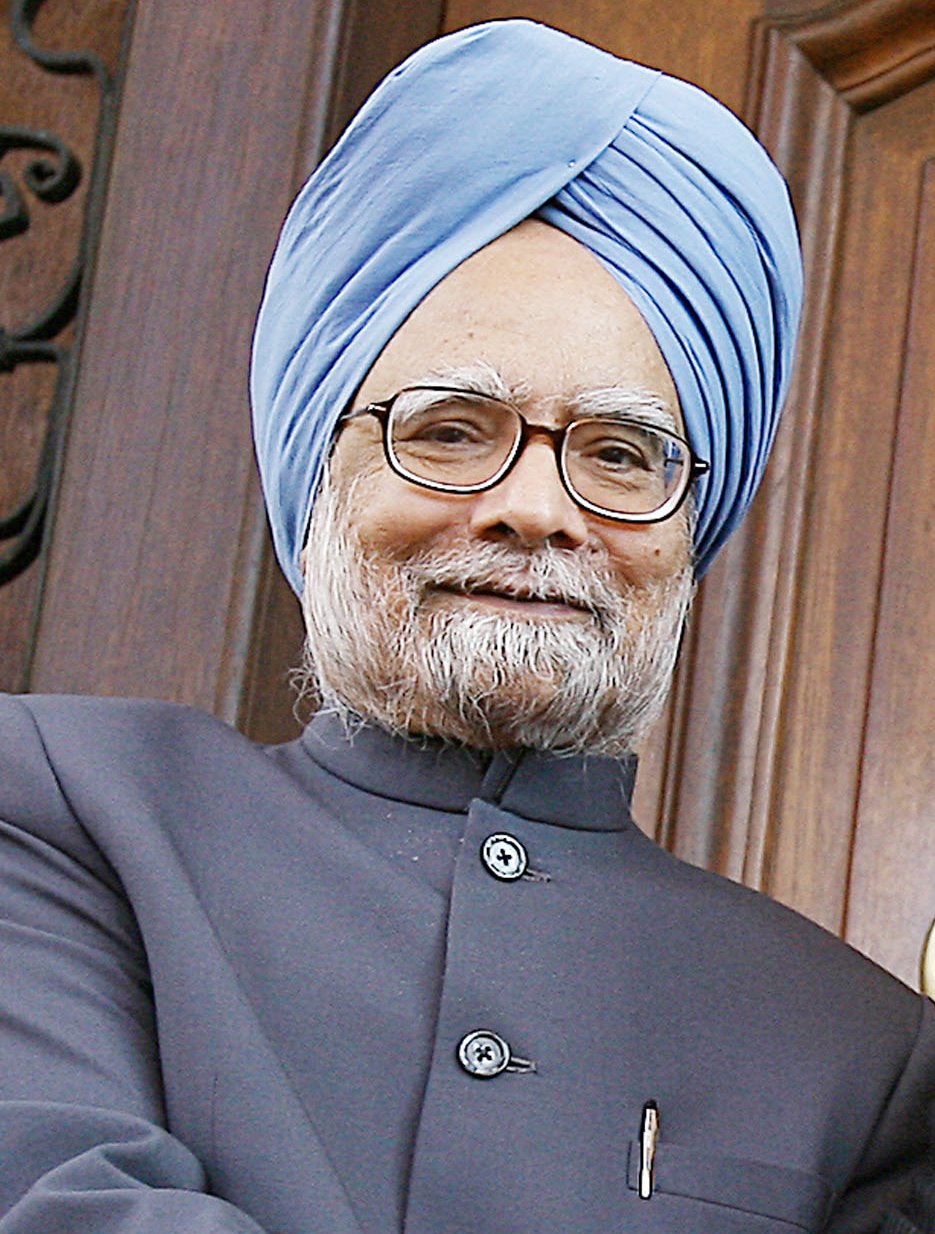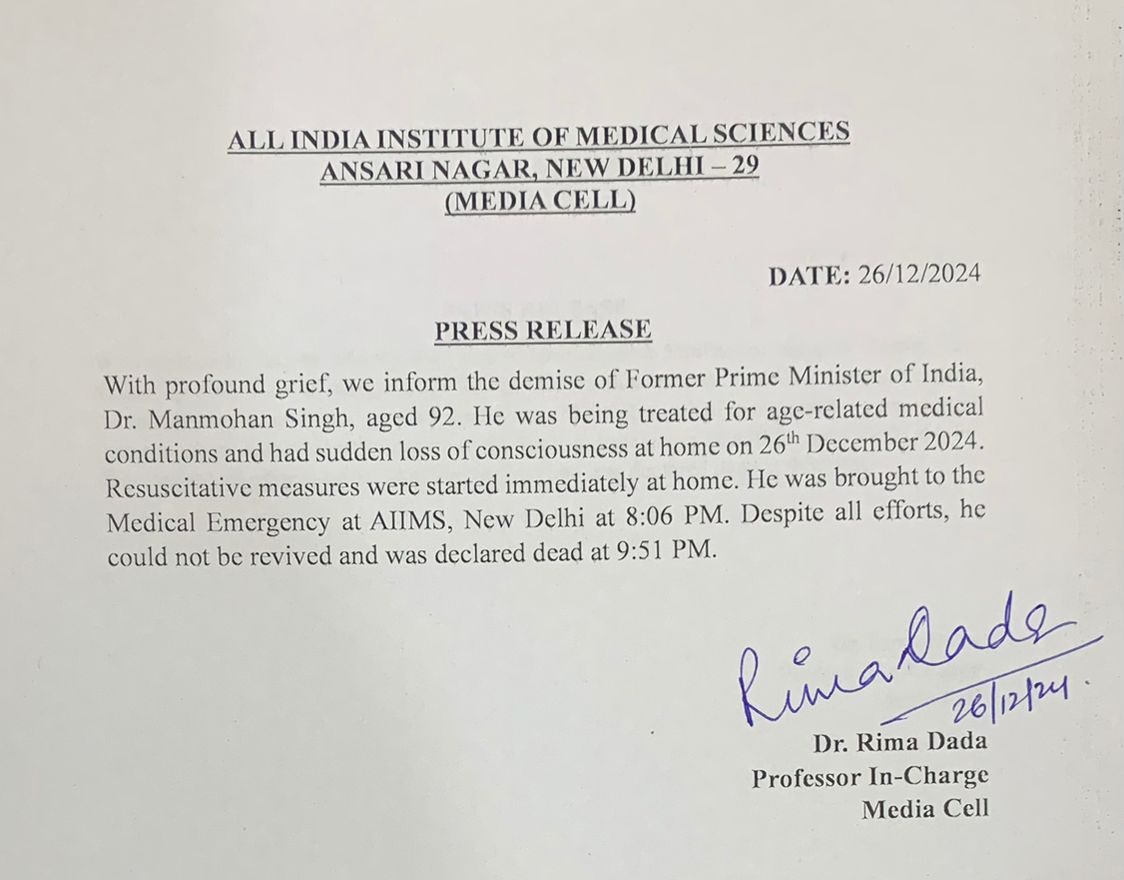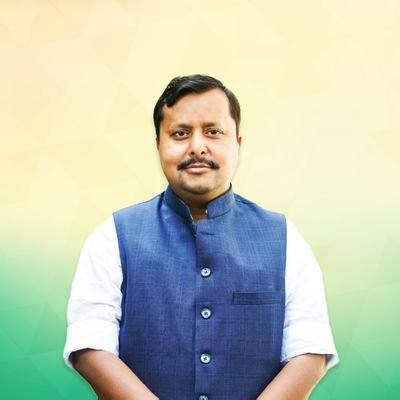
Dr. Manmohan Singh
New Delhi: Former Prime Minister Manmohan Singh passed away today evening. He breathed his last at New Delhi’s All India Institute of Medical Sciences where he was admitted today evening in a critical condition.
Hospital sources said 92-year-old Dr Singh, who uninterruptedly served the country as Prime Minister for two terms between 2004-2009 and 2009-2014, was brought to the emergency department of the hospital as his health had deteriorated and he lost consciousness.
As a mark of respect to the former prime minister, seven days of state mourning will be observed throughout India from December 26, 2024, to January 1, 2025. During this period the National flag will be flown at half mast throughout India where it is regularly flown and there will be no official entertainment during the period of state mourning.
State funeral will be accorded to the departed dignitary.
Dr Manmohan Singh, an acclaimed economist, is credited with opening up of India’s economy to usher in an era of liberalisation as the Finance Minister in Prime Minister PV Narasimha Rao’s cabinet in 1991. His book, “India’s Export Trends and Prospects for Self-Sustained Growth” [Clarendon Press, Oxford, 1964] was an early critique of India’s inward-oriented trade policy.
As Prime Minister in the United Progressive Alliance-led Congress government, he was the architect of the India-USA civil nuclear deal. The United States and India shared three objectives in undertaking this initiative: to remove core differences that impeded our strategic relationship for more than 30 years, to support India’s economic growth and energy security in an environmentally sound way, and to strengthen the global nonproliferation regime.
“His leadership in advancing the U.S.-India Civil Nuclear Cooperation Agreement signified a major investment in the potential of the U.S.-India relationship,” US Secretary of State Antony J. Blinken in Washington. Offering his condolences to the people of India on the passing away of Dr Singh, Blinken described the former Indian prime minister as one of the greatest champions of the U.S.-India strategic partnership, whose work laid the foundation for much of what the two countries accomplished together in the past two decades. “We mourn Dr. Singh’s passing and will always remember his dedication to bringing the United States and India closer together,” he said.
Dr Singh, India’s fourteenth Prime Minister, was also the country’s fourth longest-serving prime minister after Jawaharlal Nehru, Indira Gandhi, and Narendra Modi.
Modi, who succeeded Dr Singh as the nation’s 15th Prime Minister in 2014, posted on X: “India mourns the loss of one of its most distinguished leaders, Dr Manmohan Singh Ji. Rising from humble origins, he rose to become a respected economist. He served in various government positions as well, including as Finance Minister, leaving a strong imprint on our economic policy over the years. His interventions in Parliament were also insightful. As our Prime Minister, he made extensive efforts to improve people’s lives.”
President of India, Droupadi Murmu described Dr Singh as one of those rare politicians who also straddled the worlds of academia and administration with equal ease. “In his various roles in public offices, he made critical contributions to reforming the Indian economy,” Murmu posted on X and said he will always be remembered for his service to the nation, his unblemished political life and his utmost humility. “His passing is a great loss to all of us. I pay my respectful homage to one of the greatest sons of Bharat and convey my heartfelt condolences to his family, friends and admirers,” she stated. Congress leader Rahul Gandhi, the Leader of the Oppostiion in the Lok Sabha, said he lost a mentor and guide. “Millions of us who admired him will remember him with the utmost pride,” he stated and mentioned in a post on X that Dr Singh led India with immense wisdom and integrity. “His humility and deep understanding of economics inspired the nation. My heartfelt condolences to Mrs. Kaur and the family,” he stated. I have lost a mentor and guide.
Dr Singh Singh was born on September 26, 1932, in a village, Gah, in the Punjab province of undivided India, which later became part of Pakistan after India’s partition. He completed his Matriculation examinations from the Punjab University in 1948. he then moved to the University of Cambridge, UK, where he earned a First Class Honours degree in Economics in 1957. He followed this with a D. Phil in Economics from Nuffield College at Oxford University in 1962.
He started his academic career as a faculty of Punjab University and then the prestigious Delhi School of Economics. He also had a brief stint at the UNCTAD Secretariat which presaged his subsequent appointment as Secretary General of the South Commission in Geneva between 1987 and 1990.
In 1971, Dr Singh joined the Government of India as an Economic Advisor in the Commerce Ministry. This was soon followed by his appointment as Chief Economic Advisor in the Ministry of Finance in 1972. Among the many Governmental positions that Dr Singh has occupied are Secretary in the Ministry of Finance; Deputy Chairman of the Planning Commission; Governor of the Reserve Bank of India; Advisor of the Prime Minister; and Chairman of the University Grants Commission.
In his political career, Dr Singh was a Member of the Rajya Sabha since 1991, where he was Leader of the Opposition between 1998 and 2004. He was sworn in as Prime Minister for the first time on May 22 after the 2004 general elections and took the oath of office for a second term on May 22, 2009.
He is survived by his wife Gursharan Kaur and three daughters.
– global bihari bureau







May his soul rest in peace 😢
As a journalist experienced his humility, inspite of his stature, irrespective of party politics 🙏